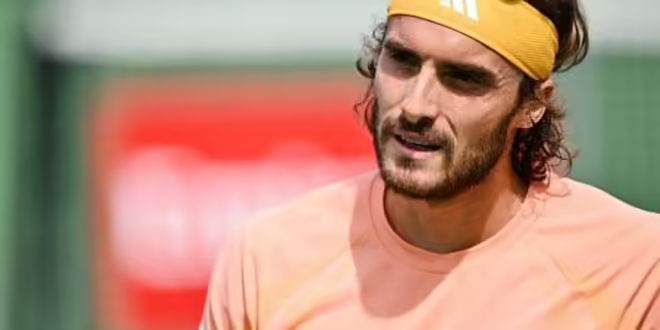
In a recent turn of events that has sent shockwaves through the tennis world, Greek tennis star Stefanos Tsitsipas has accused Serbian tennis legend Novak Đoković of espionage. This explosive allegation has added another layer of tension to an already intense rivalry between the two top players.
The controversy erupted following a match at a high-profile tournament, where Tsitsipas noticed something unusual about Đoković’s behavior on the court. According to Tsitsipas, Đoković was allegedly communicating with his team in a manner that suggested he was gathering inside information about Tsitsipas’ strategies and physical condition. Tsitsipas claimed that this was not the first time he had felt that Đoković had an unfair advantage, but this instance was particularly blatant.
In his post-match interview, Tsitsipas didn’t hold back. He stated, “There were moments during the match when I felt like Novak knew exactly what I was going to do next. It was as if he had a window into my tactics. I’m not saying he cheated, but something didn’t feel right.”
Tsitsipas’ accusations have sparked a debate within the tennis community about the ethics of match preparation and in-game tactics. While it is common for players to study their opponents’ previous matches and tendencies, the line between legitimate preparation and unethical behavior is thin.
Đoković, on the other hand, has strongly denied the allegations, calling them “ridiculous” and “completely unfounded.” In a statement released by his team, Đoković emphasized that his success on the court is a result of hard work, dedication, and a deep understanding of the game, not any form of unfair play. He also pointed out that Tsitsipas’ frustrations might stem from the pressure of competing at the highest level and the disappointment of losing a match.
“This is not the first time that a player has accused an opponent of something like this, especially in the heat of the moment. I respect Stefanos as a competitor, but these accusations are completely false. I’ve always played by the rules, and I will continue to do so,” Đoković stated.
The tennis community has been divided in its reaction to these accusations. Some believe that Tsitsipas might be overreacting or misinterpreting Đoković’s actions, while others think that there could be some truth to his claims. Critics of Tsitsipas argue that making such accusations without concrete evidence is damaging to the sport and could tarnish the reputation of an esteemed player like Đoković.
In contrast, Tsitsipas’ supporters argue that his concerns should be taken seriously and investigated, as the integrity of the sport is paramount. They point out that even the slightest hint of unfair play could undermine the trust between players and the spirit of fair competition.
The governing bodies of tennis have not yet commented on the incident, but it is likely that they will be closely monitoring the situation. Whether or not an official investigation will be launched remains to be seen, but the incident has certainly put the spotlight on the relationship between two of the sport’s biggest stars.
As the tennis season progresses, this controversy is expected to continue influencing the dynamics on and off the court. Both players will undoubtedly face questions about the incident in the coming weeks, and how they handle the situation could have significant implications for their careers and their rivalry.